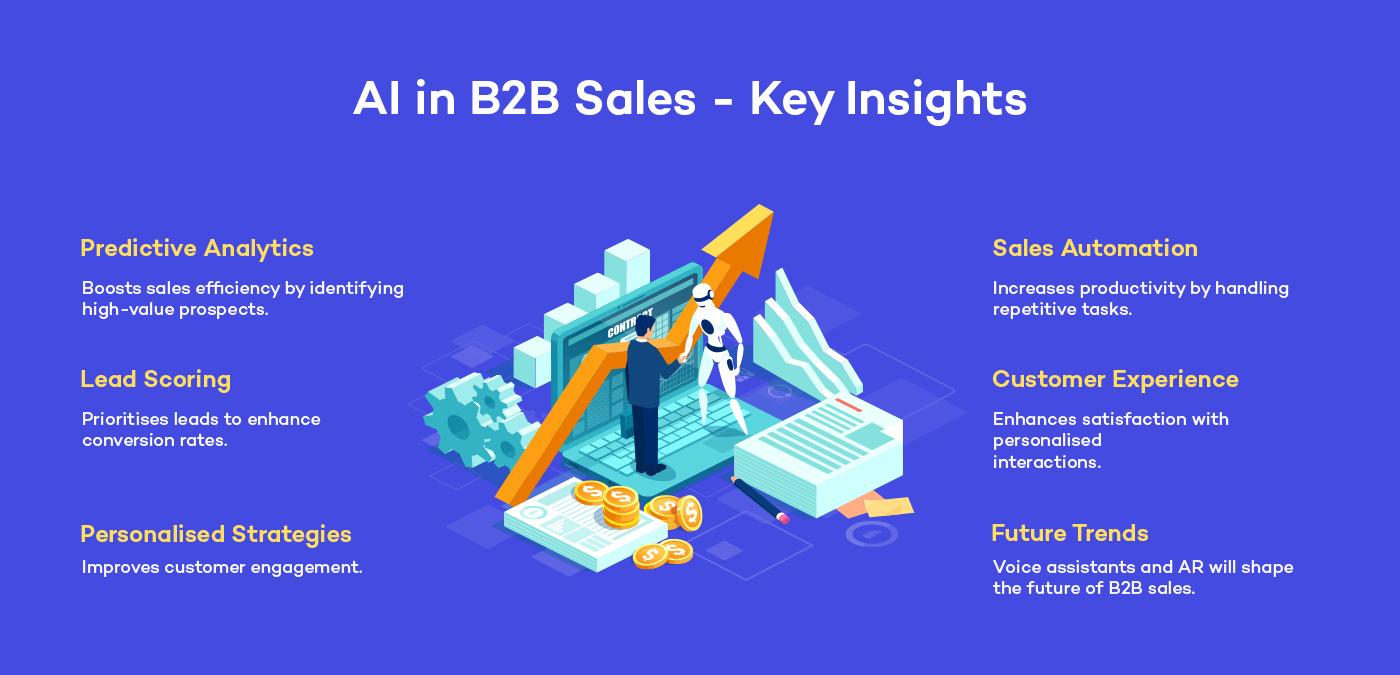The Future of B2B: Using AI Automation to Drive Success
The landscape of B2B is moving as firms progressively transform to AI automation for calculated benefit. This change guarantees to improve performance and consumer involvement through innovative modern technologies. The combination of these devices is not without its challenges. Recognizing how organizations can navigate this advancing terrain will certainly be important for future success. What variables will determine the efficiency of AI in this sector? The responses might redefine traditional service versions.
Understanding AI Automation in B2B
As organizations increasingly seek effectiveness, recognizing AI automation in B2B comes to be important. AI automation refers to using artificial knowledge technologies to improve and simplify organization processes. In the B2B industry, this includes the assimilation of AI tools to take care of tasks such as data evaluation, client communications, and supply chain procedures. By leveraging machine understanding and natural language processing, business can improve accuracy, minimize human mistake, and speed up decision-making (Minarik AI). AI automation assists in the handling of big volumes of data, making it possible for businesses to draw out valuable insights and maximize their procedures. As companies browse this technical landscape, an extensive grip of AI automation's capacities will certainly empower them to stay competitive and receptive to market demands
Key Benefits of AI Automation for Companies
While numerous companies grapple with boosting functional needs, AI automation offers various benefits that can noticeably boost their efficiency. One substantial advantage is performance; AI systems can do recurring tasks quicker and with higher accuracy than people, thereby releasing and reducing mistakes up staff members for more strategic efforts. In addition, AI automation allows data-driven decision-making by assessing huge datasets promptly, giving insights that inform service strategies. Cost decrease is an additional key benefit, as automation decreases labor prices and maximizes resource allocation. AI can improve scalability, permitting companies to adapt to market modifications swiftly. Ultimately, the combination of AI automation cultivates innovation, allowing firms to remain affordable in a rapidly developing landscape.
Changing Consumer Experiences With AI
AI is reshaping consumer experiences by enhancing and enabling individualized communications engagement. With the execution of anticipating analytics, companies can prepare for consumer requirements and choices, bring about much more tailored solutions. Furthermore, streamlining assistance processes with AI technology boosts effectiveness and complete satisfaction, ultimately transforming the overall consumer trip.
Customized Communications and Engagement
Individualized communications have actually come to be a cornerstone of effective customer engagement in the B2B landscape. By leveraging AI-driven solutions, businesses can customize their communication and offerings to fulfill the distinct demands of each customer. Automated systems examine customer preferences, data, and habits, making it possible for companies to develop personalized experiences that resonate with their audience. This level of personalization not only boosts consumer complete satisfaction but likewise fosters lasting commitment. Additionally, AI tools facilitate real-time communications, permitting businesses to react promptly and successfully to inquiries and comments. Consequently, firms can build stronger partnerships with clients, guaranteeing that their services align with developing assumptions. Eventually, tailored involvement through AI leads to enhanced results and sustained success in the competitive B2B market.
Anticipating Analytics Implementation
As companies significantly seek to enhance client experiences, executing predictive analytics has emerged as a pivotal approach in the B2B sector. By leveraging data-driven insights, organizations can anticipate consumer demands and preferences, enabling them to customize their offerings better. Predictive analytics uses historical data and innovative formulas to forecast future habits, permitting companies to determine potential challenges and chances. This aggressive strategy not only boosts customer satisfaction however also promotes loyalty by supplying pertinent and prompt solutions. In addition, anticipating analytics helps in source allocation, ensuring that marketing efforts are focused on high-value prospects. Eventually, the integration of predictive analytics outfits B2B companies with the devices necessary to transform consumer interactions and drive long-lasting success in a significantly affordable landscape.
Improving Support Procedures
Enhancing customer experiences in the B2B sector prolongs past anticipating analytics; simplifying assistance processes plays a crucial function. By incorporating AI-driven remedies, services can automate regular queries and boost feedback times, leading to enhanced client satisfaction. Chatbots and digital aides offer 24/7 assistance, dealing with customer requires immediately and reducing the worry on human representatives. This automation enables groups to concentrate on complex issues, fostering more significant interactions. In addition, AI tools can analyze support information to recognize patterns and areas for improvement, guaranteeing continual enhancement of service high quality. As organizations embrace these innovations, they place themselves as customer-centric and responsive, eventually driving commitment and organization development in an increasingly competitive landscape.
Simplifying Operations and Processes
Enhancing operations and processes in B2B environments is necessary for boosting overall effectiveness. By maximizing workflow performance and automating routine tasks, organizations can lower manual mistakes and free up beneficial resources. This shift not just boosts performance however Related Site also allows groups to concentrate on critical efforts that drive growth.
Optimizing Workflow Effectiveness
Maximizing process effectiveness is necessary for companies seeking to lower operational costs and enhance performance. By analyzing existing processes, companies can recognize traffic jams and redundancies that prevent performance. Implementing structured treatments boosts communication and cooperation among teams, guaranteeing that tasks are finished much more quickly. Using data-driven understandings enables business to make informed decisions that fine-tune operations further. In addition, taking on incorporated innovations can facilitate seamless details flow, lessening the threat of delays and errors. As organizations accept these modifications, they not just foster a more nimble workplace however likewise place themselves to react swiftly to market needs - AI Automation For B2B. Ultimately, concentrating on operations efficiency enables companies to designate sources properly, driving long-term success in an increasingly affordable landscape
Automating Regular Tasks
Numerous organizations are progressively transforming to automation to manage regular tasks, recognizing its possible to substantially improve functional effectiveness. By deploying AI-driven options, companies can enhance recurring activities such as data entrance, invoice handling, and consumer questions. This change not just decreases human mistake however likewise maximizes useful worker time, permitting personnel to concentrate on tactical campaigns and value-added tasks. Additionally, automation can boost feedback times and solution uniformity, bring about improved customer contentment. As organizations browse an affordable landscape, leveraging automation for routine tasks becomes crucial for maintaining and enhancing operations dexterity. Ultimately, this technique cultivates advancement and drives growth, placing organizations for long-term success in the progressing B2B setting.
Enhancing Decision-Making Through Information Insights

Getting Rid Of Difficulties in AI Implementation
Although AI implementation holds the promise of considerable operational enhancements, organizations often encounter a myriad of obstacles that can impede progression. Secret barriers consist of data top quality issues, as many business deal with inconsistent or insufficient datasets essential for efficient AI training. Furthermore, resistance to change within the workforce can hamper the adoption of AI modern technologies, as workers may be afraid job variation or lack the essential abilities. Spending plan restraints additionally offer an obstacle, restricting financial investment in the required infrastructure and talent. Moreover, integrating AI systems with existing processes can be complex, demanding substantial time and resources. Getting rid of these difficulties necessitates a critical technique that includes thorough training, modification management, and a dedication to continuous enhancement in AI initiatives.
Future Fads: The Following Frontier in B2B Automation
While the landscape of B2B automation remains to advance, arising patterns are poised to redefine exactly how companies run. The integration of sophisticated artificial intelligence will certainly help with much more tailored client experiences, enabling organizations to tailor remedies exactly to client requirements. Additionally, the rise of predictive analytics will allow organizations to expect market changes and maximize decision-making procedures. Automation of routine jobs via robot procedure automation (RPA) will certainly boost performance, reducing operational costs substantially. Additionally, the fostering of blockchain innovation assures boosted transparency and safety in transactions. As these developments gain traction, companies will progressively take advantage of AI-driven insights to foster collaboration, improve supply chains, and enhance overall efficiency, marking a transformative change in the B2B landscape.
Often Asked Questions
What Sorts Of Businesses Can Benefit A Lot Of From AI Automation?
Production, logistics, and customer care companies can benefit most from AI automation. These fields boost functional performance, reduce costs, and improve client interactions, ultimately resulting in boosted efficiency and earnings in an affordable market.
Exactly How Can Little Businesses Execute AI Automation Efficiently?
Local business can execute AI automation efficiently by identifying repetitive jobs, picking straightforward devices, making sure appropriate training for workers, and slowly integrating solutions to maximize operations while checking efficiency and changing techniques based on responses.
What Are Typical False Impressions Regarding AI in B2B?
Typical misconceptions concerning AI in B2B include the idea that it is only for huge ventures, that it guarantees immediate results, which it can totally replace human decision-making instead than enhancing it. Growth Systems For B2B.
Exactly How Does AI Automation Effect Worker Duties and Task Protection?
AI automation reshapes staff member duties by enhancing recurring jobs, cultivating efficiency and development. While some concern task loss, it usually produces opportunities for upskilling and new placements, ultimately improving job protection with included value and performance.
What Skills Are Required to Take Care Of AI Automation Projects?

As businesses progressively look for efficiency, comprehending AI automation in B2B comes to be important. AI automation assists in the handling of huge volumes of data, making it possible for businesses to remove useful understandings and optimize their operations. While lots of organizations grapple with increasing operational demands, AI automation offers countless benefits that can significantly boost their performance. Automation of routine jobs via robot procedure automation (RPA) will enhance effectiveness, lowering functional prices considerably. Manufacturing, logistics, and customer service organizations can profit most from AI automation.